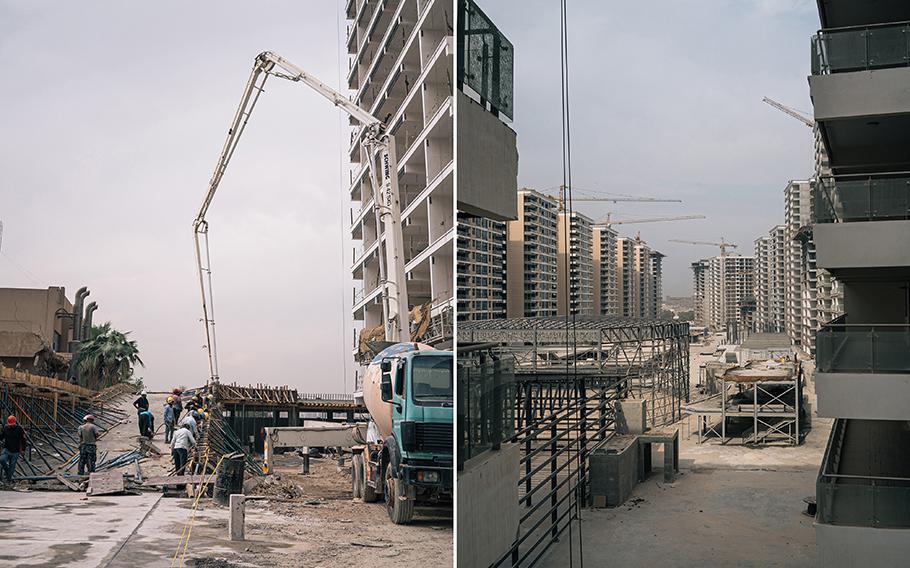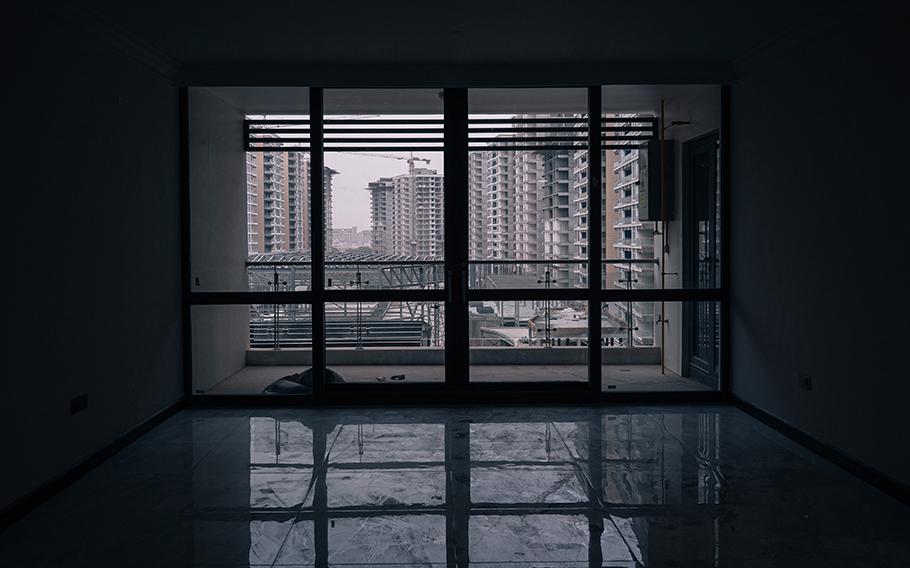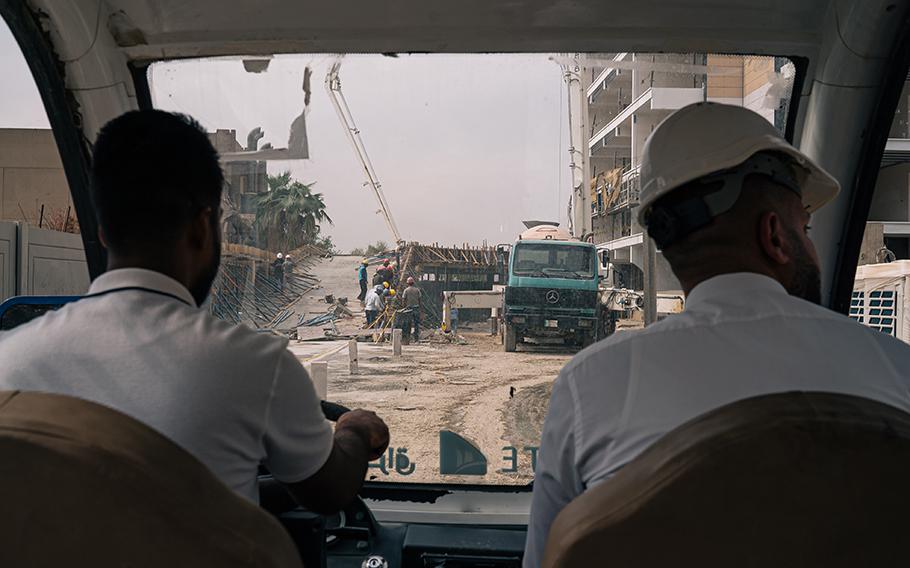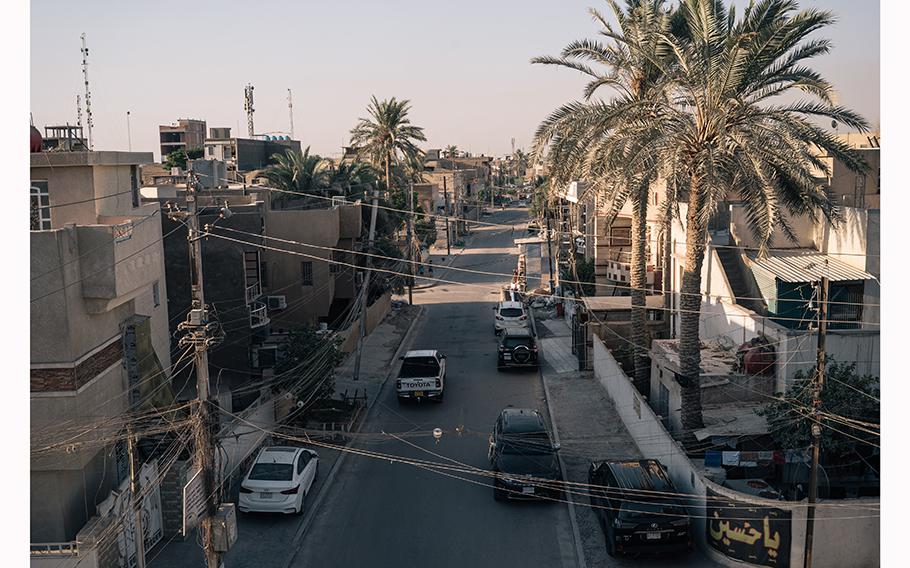Middle East
A building boom fueled by corruption is changing the face of Baghdad
The Washington Post June 30, 2023

Construction workers and buildings under construction at Iraq Gate in Baghdad in September 2022. (Alice Martins for The Washington Post)
BAGHDAD — On a recent afternoon, bursts of drilling and the clamor of jackhammers cut sharply across Baghdad's soundscape, piercing through the usual car horns and birdsong.
Twenty years after an American-led invasion plunged Iraq into conflict, a real estate boom is changing the face of this historic capital city, as construction workers demolish old brick houses and clear yards lined with palm trees to build smaller units that can be sold for astronomical rates.
A house without running water or government electricity on the western bank of the Tigris can fetch at least $2,300 per square meter. In Mansour, to the north, the rates can reach six times that figure.
It is a lucrative time for developers and property moguls, hailed by politicians as a sign of Baghdad's revival. But it is also a symptom of this country's deep-rooted corruption and widening inequality, and the vast majority of Iraqis are priced out of the market. For them, the dream of owning a home here is becoming more remote by the day, and parts of their city have grown unrecognizable.
"One million dollars will barely buy you anything there these days," said Raad al-Shimmari, a real estate broker in the upscale district of Zayouna. "Who is the land for? It's not for ordinary people any more, that's for sure."
Sometimes he wonders whether his grandchildren will able to afford a house of their own. "Surely they won't," he mused. "No one will."

View from inside an apartment in a nearly completed building at Iraq Gate in Baghdad in September 2022. (Alice Martins for The Washington Post)
Baghdad was conceived as a model city, its sand brick walls rising from the banks of the Tigris River in a circle four miles wide. Today's incarnation has no official plan at all. Home to more than 7 million people, neighborhoods sprout upward for the rich and outward for the poor as builders toil over sleek high-rises in walled-off complexes and cinder-block settlements in the dusty outskirts. Trees that offered shade from the baking sun have been cut down to make way for megamalls.
Remnants of Baghdad's architectural splendor are woven throughout the cityscape. Traditional wood-latticed windows still adorn the old homes, but renovations are expensive and expertise has dwindled. The yellow-brick houses in the old Jewish quarter still stand, but their original inhabitants have long since fled, and new owners have often neglected them to hasten the case for wrecking crews.
In Karrada, where land sells for more than $5,000 per square meter, construction workers advertise their demolition services in spray-painted scrawl on the walls of houses. Overhead, spindly wires that connect to Baghdad's overburdened electricity network are tangled thick as birds' nests on telegraph poles.
From his glass-fronted office in Zayouna, Shimmari watched a battered builder's truck rumble down the street to the stretch of bare earth where a two-story house once stood. "They're destroying our neighborhood," he said. "Look, this area was designed with 600-meter plots in mind, but now the builders are dividing them smaller and smaller for money." A customer nodded in agreement. "I saw one that was 10-by-10 meters the other day," he said.
Shimmari shook his head. "It's just not what this city was designed for. Everything, and I mean everything, is about money these days."
With Iraq's population booming and water shortages pushing rural populations to cities, the country is badly in need of more housing. In 2021, a spokesperson for the Ministry of Planning, Abdul-Zahra Al-Hindawi, estimated that the country needed at least 2.5 million additional units.

A manager of the sprawling Iraq Gate residential complex, still partially under construction even as several buildings are already inhabited, surveys a construction site in September 2022. (Alice Martins for The Washington Post)
Yet in one of the most corrupt countries in the world, real estate has become a magnet for dirty money, as high oil prices flood Iraqi markets with cash and U.S.-backed regulations on international dollar transactions limit the transfer of ill-gotten wealth abroad.
"Prices are high in part because of money laundering and corruption. When it's hard for people to send their money outside the country, they put it into property here," said Mohammed al-Rubaii, a spokesman for the Baghdad mayoralty.
Brokers smooth the process, no questions asked, for a cut of the sale or a monthly retainer.
The cash arrives in suitcases, plastic bags, even ice cream tubs, observers say, and the paper trail is hard to unwind. Iraq's land and property registration process is still paper-based. Data is not shared between government agencies. In many cases, the transactions are recorded in the names of relatives or associates, further shielding the true owners from scrutiny.
"That part is a whole industry in itself," said one broker, who spoke on the condition of anonymity to discuss the illicit dealings. "Discretion is part of the business plan," he smiled.
Politicians were among his best clients, and when a lucrative property came up, he often rifled through his cellphone to find a buyer. They rarely bartered when he called, he said - they bought "immediately."

A residential street in the Mansour district of Baghdad. Formerly spacious land plots are now divided in half as the city grows and the cost of real estate increases exponentially. (Alice Martins for The Washington Post)
As Washington Post reporters interviewed another broker in the Yarmouk district, a black Land Cruiser pulled up outside the brightly lit office. The real estate agent straightened and smoothed his hair with his hands, then broke into a wide grin as a female parliamentarian entered with two bodyguards in tow. He ushered them into a backroom and closed the door.
Researchers focusing on corruption say that one cycle of business can lead to another, each round more lucrative than the last. Once the deal is done, property deeds can be taken to banks and deposited as security for loans at three to five times the property's value, which is then funneled into new acquisitions.
In November, Iraq's judiciary said that they had confiscated 55 properties in Baghdad worth a combined $286 million, part of a case described as the "heist of the century."
Iraqis without the means or connections to play the housing market have to settle for cramped and overcrowded rentals, where lives are stifled and social problems are magnified. In a speech last month, Prime Minister Mohammed Shia al-Sudani linked the housing crisis to a rising divorce rate.
Sitting in one of Baghdad's few public parks as the summer heat ebbed on a recent evening, 38-year-old Abduljabbar al-Kinani was fretting about his daughters' future. For years, the exorbitant rental market had gobbled up the monthly paycheck he earned as an engineer. Two years ago, he had finally managed to save enough money to build a small house in his father's backyard, but for the family, that now meant a life lived almost entirely indoors.
"I had my father's garden when I was their age but now that's gone and they have nowhere to run around, or for me to read a book as they play," Kinani said.
Nearby, 26-year-old Ahmed Yassin and his fiancée Marwa worried that even the park might be sold off. It was lucrative land, after all. But it was one of the few places left where they felt like the soul of the old city was still alive.
Children played under trees by the Tigris. Nearby was the bronze statue of Scheherazade, the 9th-century queen who used her wit and her invention to win a stay of execution for one thousand and one nights.
"Imagine if these places just disappeared," Yassin said.
The couple is planning to marry next year and they want children. Yassin tells Marwa that they'll surely find a place outside of Baghdad. Marwa thinks even that is a pipe dream.